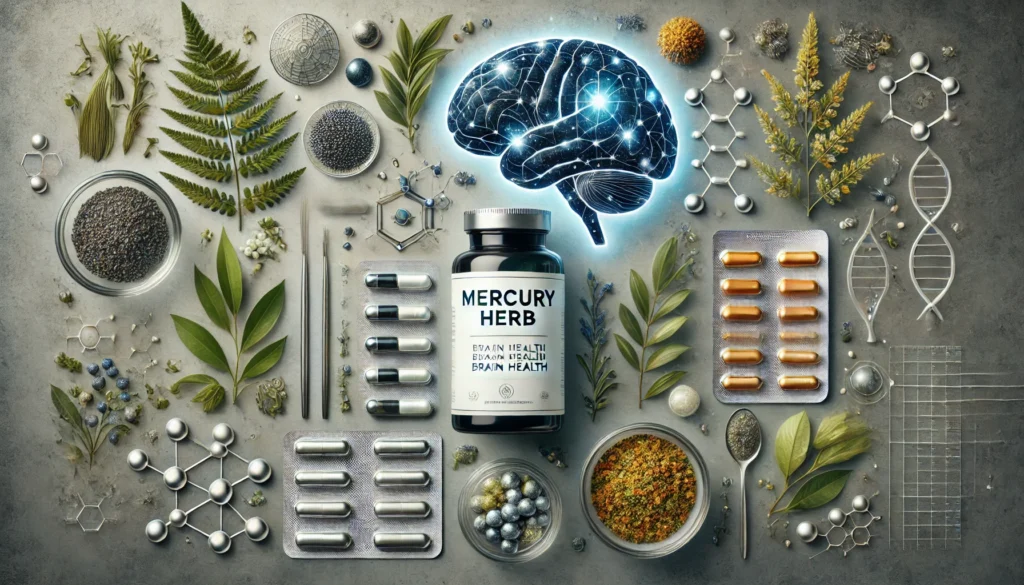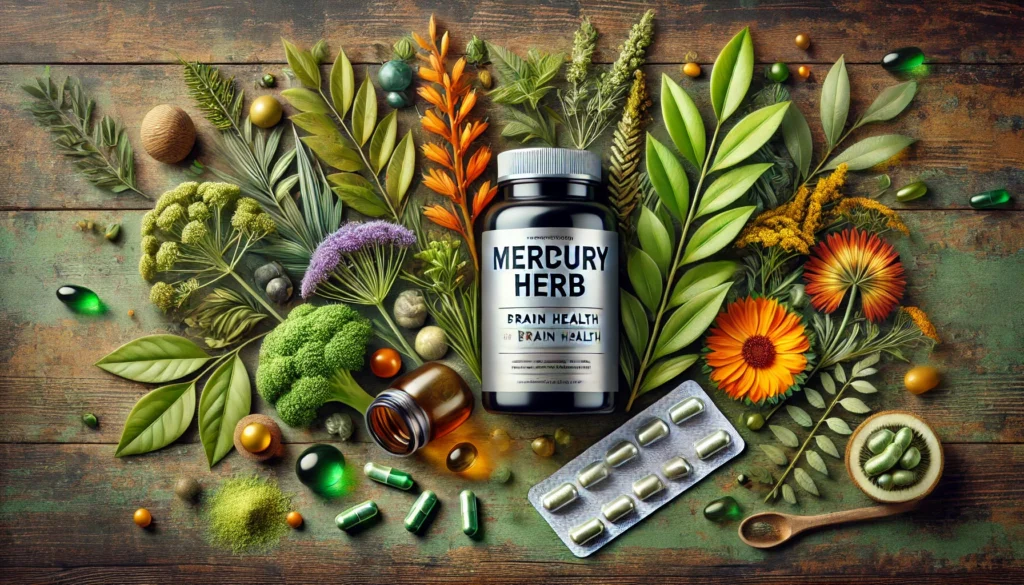Mercury Herb, sometimes referred to as “Mercury plant” in folk medicine, is a relatively lesser-known botanical supplement with potential nootropic benefits. It is derived from plants in the genus Mercurialis, specifically Mercurialis perennis and Mercurialis annua, both of which have a long history in traditional herbal medicine. While Mercury Herb has primarily been used for its purported ability to treat various inflammatory conditions, its potential as a nootropic—substances that improve cognitive function—has gained attention in recent years. This article delves into the chemistry, physiological mechanisms, benefits, dosing guidelines, side effects, interactions, and safety concerns related to Mercury Herb as a nootropic supplement.
You May Also Like:
Sources of Mercury Herb
The primary source of Mercury Herb is the genus Mercurialis, which is found across various parts of Europe, Asia, and North Africa. Mercurialis perennis, commonly known as perennial mercury, is native to temperate regions of Europe and western Asia. Meanwhile, Mercurialis annua, also called annual mercury, is native to parts of Europe and has spread to other regions around the world, often growing in disturbed areas such as roadsides and waste spaces.
Both species of Mercurialis are rich in bioactive compounds, which have been traditionally used for their purported anti-inflammatory, analgesic, and antidiabetic effects. In contemporary herbal medicine, the plant is primarily utilized for its antioxidant and anti-inflammatory properties. However, recent studies have begun exploring its potential effects on cognitive function, particularly with regard to its ability to enhance brain energy metabolism, improve focus, and protect the brain from oxidative damage.
Unlock Brain Health and Mental Resilience with Advanced Bacopa Monnieri—Shop Now on Amazon!

Chemistry of Mercury Herb
The bioactive compounds in Mercury Herb are diverse and include alkaloids, flavonoids, terpenoids, and phenolic acids, all of which contribute to its pharmacological properties. Key compounds believed to be responsible for its cognitive-enhancing effects include:
- Mercurial Alkaloids: The genus Mercurialis is named for its mercury-like qualities in traditional herbal medicine, partly due to the alkaloids it contains. Alkaloids such as mercurine are thought to influence neurotransmitter systems in the brain, though detailed research on these compounds is limited. Some of these alkaloids may have mild stimulant effects, enhancing focus and cognitive function in low doses.
- Flavonoids: Flavonoids are well-known for their antioxidant properties, which protect cells from oxidative stress. Mercury Herb contains a variety of flavonoids, including quercetin and kaempferol, which can cross the blood-brain barrier and have been shown to reduce neuroinflammation and protect against neurodegenerative damage. These compounds are particularly important in the context of cognitive health, as oxidative damage is a key factor in age-related decline.
- Terpenoids: These aromatic compounds play a significant role in the anti-inflammatory and neuroprotective effects of Mercury Herb. Terpenoids such as β-caryophyllene are believed to modulate inflammatory pathways and help reduce neural oxidative stress, promoting long-term brain health.
- Phenolic Acids: Phenolic compounds, including caffeic acid, have potent antioxidant effects. By neutralizing free radicals, these compounds prevent the damage that oxidative stress can cause to neurons, thereby supporting cognitive health and preventing cognitive decline.
Although the full chemical profile of Mercury Herb has not been exhaustively studied, it is evident that the combination of these compounds contributes to its overall medicinal effects, with potential implications for cognitive enhancement.
Physiological Mechanisms of Mercury Herb in the Body and Brain
The primary nootropic effects of Mercury Herb are thought to arise from its ability to modulate neurotransmitter systems, reduce oxidative damage, and improve energy metabolism in the brain. These mechanisms are critical for supporting cognitive function, particularly as one ages or under conditions of mental fatigue. Below, we explore the potential physiological actions of Mercury Herb on the body and brain.
1. Neuroprotection through Antioxidant Activity
As with many nootropic supplements, one of the main mechanisms through which Mercury Herb may benefit the brain is by reducing oxidative stress. The brain, due to its high oxygen demand, is particularly vulnerable to the damaging effects of reactive oxygen species (ROS). Flavonoids, terpenoids, and phenolic acids found in Mercury Herb function as potent antioxidants, neutralizing ROS and thereby reducing the potential for neuronal damage. This neuroprotective effect is vital for maintaining brain health and preventing neurodegenerative diseases such as Alzheimer’s and Parkinson’s.
2. Enhancement of Cognitive Function via Alkaloids
Some of the alkaloids present in Mercury Herb, such as mercurine, may act as mild stimulants of the central nervous system. These compounds are believed to influence the release of neurotransmitters like dopamine and acetylcholine, both of which are crucial for memory, attention, and learning. By modulating these neurotransmitter systems, Mercury Herb could theoretically enhance mental focus and improve overall cognitive performance. While direct evidence of these effects is sparse, alkaloids from related species have demonstrated similar neuro-modulatory effects in animal studies.
3. Reduction of Neuroinflammation
Chronic inflammation is increasingly recognized as a contributor to cognitive decline and neurodegenerative conditions. Mercury Herb contains compounds that can help reduce neuroinflammation by inhibiting the activation of pro-inflammatory pathways in the brain. This reduction in inflammation may not only protect against age-related cognitive decline but also improve cognitive function in individuals suffering from conditions like chronic stress or mild cognitive impairment.
4. Improvement of Mitochondrial Function
Emerging research suggests that mitochondria, the energy-producing organelles within cells, play a key role in brain function. Compounds in Mercury Herb, particularly its flavonoids and terpenoids, may support mitochondrial health by enhancing energy production within brain cells. This could be especially beneficial in individuals experiencing mental fatigue or reduced cognitive function due to low energy availability in the brain.
Ashwagandha aids in memory retention and learning—Support Mental Clarity, Buy Today on Amazon!

Nootropic Benefits of Mercury Herb
Given its biochemical properties and mechanisms of action, Mercury Herb shows promise as a nootropic supplement. While its nootropic benefits have not been extensively studied, we can hypothesize several potential cognitive enhancements based on the known effects of its active compounds.
1. Cognitive Enhancement and Mental Clarity
Mercury Herb’s antioxidant and neuroprotective properties may improve cognitive function by protecting neurons from oxidative damage. Its ability to enhance mitochondrial energy production may also support cognitive processes that require high amounts of cellular energy, such as attention, focus, and memory. The flavonoids in Mercury Herb may also help increase the brain’s ability to perform under stress, making it a potential tool for enhancing mental clarity during times of cognitive fatigue.
2. Memory and Learning Improvement
By modulating neurotransmitter systems such as acetylcholine and dopamine, Mercury Herb may improve memory and learning capabilities. Acetylcholine is especially crucial for memory consolidation, while dopamine supports motivation and learning. Although research directly linking Mercury Herb to improved memory is limited, studies on similar plants suggest that its active compounds could help facilitate these cognitive processes.
3. Neuroprotection Against Cognitive Decline
The antioxidant and anti-inflammatory compounds in Mercury Herb may help protect the brain from oxidative damage, a major factor in age-related cognitive decline. Regular supplementation may provide long-term benefits for maintaining cognitive function, potentially delaying the onset of neurodegenerative diseases like Alzheimer’s and Parkinson’s. Additionally, by supporting healthy mitochondrial function, Mercury Herb could contribute to the preservation of neuronal health.
Some of the alkaloids in Mercury Herb are believed to have mild psychoactive effects, which may help regulate mood and alleviate symptoms of stress or anxiety. While Mercury Herb is not typically used as a primary treatment for mood disorders, its combination of neuroprotective and anti-inflammatory compounds could promote overall emotional well-being and improve cognitive performance, particularly in individuals with mild mood disturbances.

Dosage and Supplementation Guidelines
As with many herbal supplements, the appropriate dosage of Mercury Herb is not universally agreed upon, and much depends on the specific formulation and concentration of active compounds. Below are general dosage recommendations based on available research and traditional usage.
1. General Nootropic Dosage
For cognitive enhancement, a typical dose of Mercury Herb may range from 300 mg to 500 mg per day, depending on the potency of the extract. This dosage should be taken with food to enhance absorption and minimize gastrointestinal discomfort. It is advisable to start with a lower dose and gradually increase as needed.
2. Neuroprotective Dosage
For those seeking neuroprotective benefits, a daily dose of 500 mg to 1,000 mg of Mercury Herb extract may be appropriate. This higher dosage may help combat oxidative stress and inflammation, particularly in individuals concerned with age-related cognitive decline or neurodegenerative conditions. However, consulting with a healthcare provider is recommended before starting high-dose supplementation.
3. Supplement Forms
Mercury Herb supplements are available in capsule, tablet, and liquid extract forms. The liquid extract may offer faster absorption, while capsules and tablets are more convenient for those seeking a consistent dosage. As with any supplement, it is important to follow the manufacturer’s recommended dosage.
Side Effects and Safety
While Mercury Herb is generally considered safe for most individuals, there are some potential side effects and safety concerns that should be taken into account.
1. Gastrointestinal Disturbances
Some individuals may experience mild gastrointestinal discomfort when taking Mercury Herb, including nausea, diarrhea, or stomach cramps. To reduce the likelihood of these effects, it is recommended to take Mercury Herb with food.
2. Allergic Reactions
Though rare, some people may experience allergic reactions to Mercury Herb. Symptoms can include skin rashes, itching, or swelling. If any signs of an allergic reaction occur, it is crucial to discontinue use and consult a healthcare provider.
3. Potential Toxicity in High Doses
High doses of Mercury Herb may potentially lead to mercury toxicity, as excessive use of mercury-based compounds has been linked to neurological damage. While the levels of mercury in Mercury Herb are typically low, caution should be exercised, particularly with long-term use.

Interactions with Other Supplements and Medications
Mercury Herb may interact with several other supplements and medications, potentially altering their effects or causing adverse reactions. Key interactions to be aware of include:
- Antidepressants: Mercury Herb’s alkaloids could potentially interfere with the action of certain antidepressants, particularly those affecting serotonin levels. Caution is advised when combining Mercury Herb with these medications.
- Blood Thinners: Due to its anti-inflammatory effects, Mercury Herb may interact with blood-thinning medications like warfarin or aspirin. Regular monitoring of blood clotting function is recommended if using these medications alongside Mercury Herb.
Conclusion: Should You Consider Mercury Herb as a Nootropic?
While scientific research on Mercury Herb as a nootropic is still limited, its rich chemical profile suggests potential benefits for cognitive enhancement, neuroprotection, and mood regulation. The herb’s antioxidant, anti-inflammatory, and neuroprotective properties make it an interesting candidate for improving brain health and reducing the risk of cognitive decline. However, as with any supplement, it is important to consult with a healthcare professional before starting Mercury Herb supplementation, particularly if you have pre-existing health conditions or are taking other medications. If used responsibly and with appropriate dosing, Mercury Herb could serve as a valuable addition to a nootropic regimen.

References:
- Mercury Herb – Uses, Side Effects, and More. Retrieved from: https://www.webmd.com/vitamins/ai/ingredientmono-567/mercury-herb
- Phytochemicals for Improving Aspects of Cognitive Function and Psychological State Potentially Relevant to Sports Performance. Retrieved from: https://pubmed.ncbi.nlm.nih.gov/30671903/
- Mitochondria impact brain function and cognition. Retrieved from: https://pmc.ncbi.nlm.nih.gov/articles/PMC3890847/
Important Note: The information contained in this article is for general informational purposes only, and should not be construed as health or medical advice, nor is it intended to diagnose, prevent, treat, or cure any disease or health condition. Before embarking on any diet, fitness regimen, or program of nutritional supplementation, it is advisable to consult your healthcare professional in order to determine its safety and probable efficacy in terms of your individual state of health.
Regarding Nutritional Supplements Or Other Non-Prescription Health Products: If any nutritional supplements or other non-prescription health products are mentioned in the foregoing article, any claims or statements made about them have not been evaluated by the U.S. Food and Drug Administration, and such nutritional supplements or other health products are not intended to diagnose, treat, cure, or prevent any disease.


